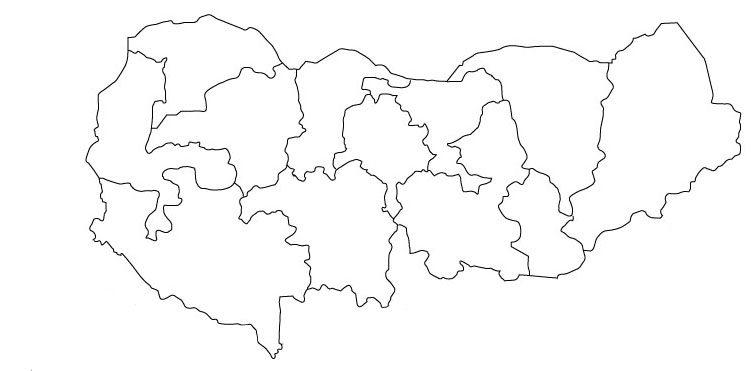The Nigeria Papers: Sharīʿa Implementation in Northern Nigeria
Acknowledgments

Project Profile
SHARIAsource is pleased to make available a comprehensive collection of documentary material and scholarly analysis on the programs of “sharīʿa implementation” (the application of Islamic law) undertaken by twelve northern Nigerian states beginning in 1999. The material includes, among other things, the various state statutes establishing Sharīʿa Courts; Sharīʿa Commissions and Councils of Ulama, Zakat and Endowment Boards, and hisbah groups; the Sharia Penal and Criminal Procedure Codes that were enacted; selected high-profile cases, including the famous zinā cases of Safiyatu Hussaini and Amina Lawal; and a great deal of information about how the new laws are being applied and how the new institutions are functioning.
OVERVIEW: Project on Islamic Law Implementation in Northern Nigeria
“Sharīʿa implementation” in northern Nigeria was launched in Gusau, the capital of Zamfara State, on 27 October 1999. By the end of 2001 eleven other states (out of 36 within the Nigerian federation), and a number of local governments within them, had joined Zamfara in enacting legislation or taking executive action aimed at making their jurisdictions more “sharia compliant” than they had formerly been. Each “sharia state” (as they were called) did it somewhat differently, but in sum:
-
All sharīʿa states reinstated Islamic criminal law in their jurisdictions, in the form of new “Sharīʿa Penal Codes” and “Sharīʿa Criminal Procedure Codes” applicable to Muslims.
-
All sharia states also enacted “Sharīʿa Courts Laws,” establishing new inferior Sharīʿa Courts, with original jurisdiction to apply the full range of Islamic law, civil and criminal, to Muslims. They also extended the jurisdiction of their pre-existing Sharīʿa Courts of Appeal to all matters, civil and criminal, decided in the inferior Sharīʿa Courts.
-
A wide range of other legislation was enacted aimed at particular “social vices” and “un-Islamic behavior”, like the consumption of alcohol, gambling, prostitution, unedifying media, and the mixing together of unrelated males and females. Two states, Zamfara and Kano – uniquely among all Nigerian states – even tackled the pan-Nigerian problem of corruption, setting up their own statutory Public Complaints and Anti-Corruption Commissions in accordance with Islamic principles.
-
A range of other institutions were established –Sharīʿa Commissions and Councils of Ulama with advisory and executive functions; Zakat and Endowment Boards and Committees for the collection and distribution of zakat and the administration of wakfs; and hisbah organisations to monitor and encourage sharia compliance among other things.
THE 2007 SOURCEBOOK: Sharīʿa Implementation In Northern Nigeria 1999-2006: A Sourcebook
In the early years of sharīʿa implementation, extensive work was done, by a team of researchers from the University of Jos in Nigeria and the University of Bayreuth in Germany, to document and analyze what the twelve sharīʿa states were doing. This resulted in the publication, in 2007, of five volumes of Sharia Implementation in Northern Nigeria 1999-2006: A Sourcebook, compiled and edited by Philip Ostien and published by Spectrum Books Ltd. of Ibadan, Nigeria. The Sourcebook includes documentation and scholarly analysis of:
| Volume I: | Historical Background |
| Volume II: | Sharia Implementation Committee Reports and Related White Papers |
| Volume III: | Sanitizing Society |
| Volume IV: | The Sharia Penal and Criminal Procedure Codes |
| Volume V: | Two Famous Cases |
With the permission of the copyright holder, SHARIAsource is pleased to make these resources, including supplementary materials not published in hard copy, available on its research portal. The reader is invited to click through to the tables of contents of the five volumes of the 2007 Sourcebook, and then onwards to the documentary and analytical materials listed.
FURTHER DOCUMENTARY MATERIALS
In the course of the early research by the Jos and Bayreuth scholars, much other material was gathered which it was not possible to prepare for publication by 2007. This material was periodically updated, most recently in 2016 by a new team of scholars looking into “sharīʿa implementation in northern Nigeria fifteen years on”. These further documentary materials have been compiled and edited, under the following headings, again by Philip Ostien, and SHARIAsource is also pleased to make them available here:
| Further Documentary Materials I: | The Sharīʿa Courts and Their Judges |
| Further Documentary Materials II: | Hisbah Groups |
| Further Documentary Materials III: | Zakat and Endowment Boards and Committees |
| Further Documentary Materials IV: | Councils of Ulama and Related Bodies |
| Further Documentary Materials V: | Sharīʿa Implementation and Women |
SHARIA IMPLEMENTATION FIFTEEN YEARS ON
The members of the research team on “sharīʿa implementation fifteen years on” wrote reports and policy briefs based on these same documentary materials. The policy briefs are available at http://www.qeh.ox.ac.uk/content/sharia-implementation-northern-nigeria-after-15-years. The reports are to be published separately in a volume entitled Sharia Implementation in Northern Nigeria Fifteen Years On: Six Research Reports and an Overview, forthcoming in 2018.